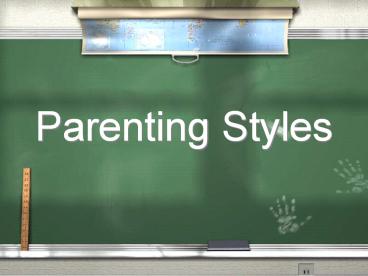Parenting Styles - PowerPoint PPT Presentation
1 / 13
Title:
Parenting Styles
Description:
Parenting Styles Authoritarian Parenting style based on the idea that children should obey their parents without question. Permissive A parenting style in which ... – PowerPoint PPT presentation
Number of Views:386
Avg rating:3.0/5.0
Title: Parenting Styles
1
Parenting Styles
2
Authoritarian
- Parenting style based on the idea that children
should obey their parents without question.
3
Permissive
- A parenting style in which parents give children
a wide range of freedom, with children being able
to set their own rules.
4
Democratic
- A parenting style in which parents allow children
some input into rules and limits put on their
behavior.
5
The Impact of Parenting Styles
- What effect do these parenting styles have on
child development outcomes? In addition to
Baumrind's initial study of 100 preschool
children, researchers have conducted numerous
other studies than have led to a number of
conclusions about the impact of parenting styles
on children. - Authoritarian parenting styles generally lead to
children who are obedient and proficient, but
they rank lower in happiness, social competence
and self-esteem. - Democratic parenting styles tend to result in
children who are happy, capable and successful
(Maccoby, 1992). - Permissive parenting often results in children
who rank low in happiness and self-regulation.
These children are more likely to experience
problems with authority and tend to perform
poorly in school.
6
Why Do Parenting Styles Differ?
- After learning about the impact of parenting
styles on child development, you may wonder why
all parents simply don't utilize an authoritative
parenting style. - After all, this parenting style is the most
likely to produce happy, confident and capable
children. What are some reasons why parenting
styles might vary? - Some potential causes of these differences
include culture, personality, family size,
parental background, socioeconomic status,
educational level and religion.
7
Why Do Parenting Styles Differ? Cont.
- Of course, the parenting styles of individual
parents also combine to create a unique blend in
each and every family. For example, the mother
may display an authoritative style while the
father favors a more permissive approach. - In order to create a cohesive approach to
parenting, it is essential that parents learn to
cooperate as they combine various elements of
their unique parenting styles.
8
Take A Parenting Style Test
- Take this test and see what kid of parent you
are - http//www.parenting.com/Mom/signalPatterns.jsp
9
Select the following parenting style according to
the description given.
- The choices are
- Authoritarian,
- Permissive,
- Democratic
10
- A parent that expects unquestioning obedience.
- A parent that is more concerned with being their
childs friend than parent. - The parents word is law parents have absolute
control. - Parents set limits and enforce family rules.
- Listens to concerns and requests of children.
Gives reasons for decisions and home rules. - Non-controlling, non-demanding children walk all
over the parents.
11
LETS CHECK YOUR ANSWERS
12
- ? A parent that expects unquestioning obedience.
(Authoritarian) - ? A parent that is more concerned with being
their childs friend than parent. (Permissive) - ? The parents word is law parents have absolute
control. (Authoritarian)
13
- Parents set limits and enforce family rules.
(Democratic) - Listens to concerns and requests of children.
Gives reasons for decisions and home rules.
(Democratic) - Non-controlling, non-demanding children walk all
over the parents. (Permissive)































